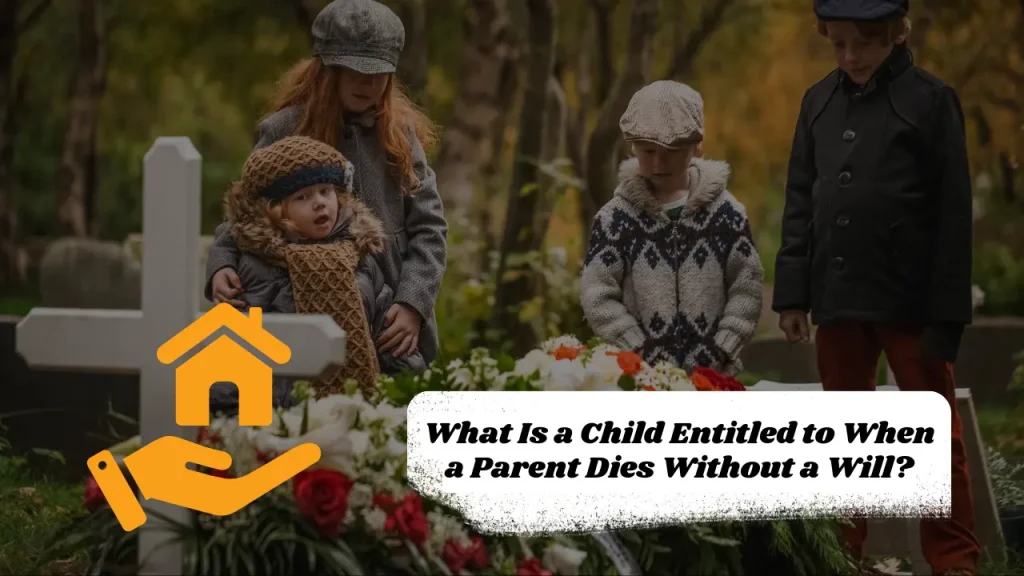What Is a Child Entitled to When a Parent Dies Without a Will?
When a parent passes away without a will, their estate is distributed according to state intestacy laws. This can lead to unexpected outcomes, especially when multiple heirs are involved. Understanding what a child is legally entitled to can help families figure out inheritance issues and plan ahead.
How Intestate Succession Works
Intestate succession refers to the legal process of distributing assets when someone dies without a will. The specific laws vary by state, but in general:
- A court-appointed administrator oversees the distribution of assets.
- Property is distributed based on family relationships, typically prioritizing spouses and children.
- If no eligible heirs exist, the estate may escheat (transfer) to the state.
What Is a Child Entitled to When a Parent Dies Without a Will?
The child’s inheritance depends on several factors, including the presence of a surviving spouse and other heirs.
1. If There Is No Surviving Spouse
- The entire estate typically goes to the child(ren) in equal shares.
- If one child predeceases the parent, their share may pass to their own children (the deceased’s grandchildren).
2. If There Is a Surviving Spouse
- In community property states (like Texas, California, and Arizona), the surviving spouse typically retains full ownership of all community property, while children may inherit separate property.
- In common law states, the estate is divided between the surviving spouse and children according to state laws.
- Many states allocate one-third to one-half of the estate to the spouse, with the rest going to the children.
3. If There Are Multiple Children
- Most states divide the inheritance equally among all children.
- If a child is deceased, their share may pass to their children (per stirpes distribution).
Related article for you:
When a Husband Dies, What Is the Wife Entitled to in Texas? A Complete Legal Guide

Difference Between Community Property and Separate Property
Community Property States
In states like Texas and California:
- Property acquired during marriage is considered community property.
- The surviving spouse typically keeps their half, and the deceased’s half is distributed to children.
Separate Property
- Assets acquired before marriage, gifts, or inheritance are considered separate property.
- These assets are divided among children and the spouse according to intestate laws.
Rights of Minor vs. Adult Children
Minor Children
- A legal guardian or trustee may manage their inheritance until they reach adulthood.
- Some states have laws ensuring minors receive financial support before assets are distributed.
Adult Children
- Adult children typically receive their share outright.
- If disputes arise, courts may intervene to determine fair distribution.
Inheritance Rights of Stepchildren and Non-Biological Children
Stepchildren
- Unless legally adopted, stepchildren do not have automatic inheritance rights.
- A will is necessary to ensure stepchildren receive a portion of the estate.
Adopted Children
- Legally adopted children have the same inheritance rights as biological children.
- They can inherit from adoptive parents but may not inherit from biological parents unless specified.
Debts and Liabilities: Do They Affect a Child’s Inheritance?
- Estate debts must be paid before distribution of assets.
- If debts exceed assets, children may receive nothing from the estate.
- Certain assets, like life insurance and retirement accounts, pass directly to named beneficiaries and are not used to settle debts.
Read also: Do Bank Account With Beneficiaries Have To Go Through Probate
How to Ensure a Child’s Financial Security
1. Create a Will
- A will allows parents to specify exactly who inherits their assets.
- It prevents disputes and ensures children receive what they are entitled to.
2. Use Trusts for Minor Children
- A trust can be set up to manage assets until children reach a specified age.
- It ensures financial stability and prevents reckless spending.
3. Designate Beneficiaries
- Naming children as beneficiaries on life insurance policies, retirement accounts, and payable-on-death accounts ensures they receive assets directly.
FAQs
Does a child always inherit a share of their parent’s estate?
Not necessarily. If a surviving spouse exists, inheritance laws may prioritize them. If there is no will, state laws determine distribution.
Can an estranged child still inherit?
Yes. Unless specifically excluded in a will, children typically retain their inheritance rights, even if estranged.
What happens if a child is a minor when the parent dies?
A guardian or trustee is typically appointed to manage the child’s inheritance until they reach adulthood.
How can I ensure my child’s inheritance is protected?
Creating a will, setting up a trust, and designating beneficiaries on financial accounts can help secure a child’s inheritance.
Conclusion
Intestate succession laws can be complex, and inheritance outcomes vary depending on multiple factors. To ensure your child inherits according to your wishes, it is crucial to create a will and consider estate planning tools like trusts and beneficiary designations.
Take Control of Your Child’s Future Today!
Consult an estate planning attorney to draft a will.
Set up a trust for minor children.
Ensure your assets go to the right people.
Need Help? Contact an Estate Planning Attorney Now!
For more information on inheritance laws, visit:
- National Association of Estate Planners & Councils
- FindLaw – Intestate Succession Laws
- State Bar of Texas – Estate Planning Guide
About the Author

Sarah Klein, JD, is an experienced estate planning attorney who has helped clients with wills, trusts, powers of attorney, and probate matters. At All About Lawyer, she simplifies complex estate laws so families can protect their assets, plan ahead, and avoid legal headaches during life’s most sensitive moments.
Read more about Sarah
